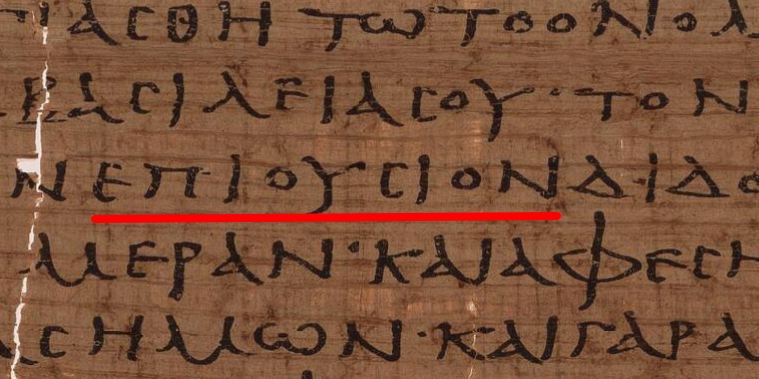the full line being “Give us today our epiousion bread”
Today, most scholars reject the translation of epiousion as meaning daily. The word daily only has a weak connection to any proposed etymologies for epiousion. Moreover, all other instances of “daily” in the English New Testament translate hemera (ἡμέρα, “day”), which does not appear in this usage.[1][2] Because there are several other Greek words based on hemera that mean daily, no reason is apparent to use such an obscure word as epiousion.[4] The daily translation also makes the term redundant, with “this day” already making clear the bread is for the current day.[21]
i don’t think wikipedia mentions this but it has ‘pious’ in the middle
Greek guy here.
Επιούσιος (e-pi-u-si-os) is a composite word (you can make an astronomical number of composite words in Greek if you want to express a new concept, such as tele-phone) and in this sentence it means that which will nourish us for the day. So daily is quite fitting here.
So it’s more like “our day’s worth of bread” than “the bread we eat every day”?
It was an oral history in one language, written down into another by low quality scribes, then translated a couple more times.
Which is why it’s always hilarious people say they have to take any translation literally.
But you don’t understand! This translation was divinely inspired! Every other one is an act of heresy and blasphemy!
It’s a two-thousand-year-long multilingual game of Telephone. How much is it even possible is left from what was originally written? (And none of it contemporary to when it supposedly happened.)
Textual critics are fairly confident that a fair amount of the texts of the New Testament were reliably copied until we get to the first extant manuscripts, and for the stuff that is very obviously messed up, they have a decent set of analytical tools that help them retroject the likeliest original wording. Not perfect, but decent.
And now we have even better scientific tools that allow us to retroject all the miracles, incorrect dates, absurdly inaccurate numbers/measurements, and the authenticity (very foundation) of it’s stories. Proving that it is all fiction.
Reminder: Until the 1800s no Christian believed that the world was older than about 6000. If you went back in time and spoke to literally any Christian at that time and said you were both Christian and believed that the earth was billions of years old they would definitely say that you’re a liar: You’re not a Christian. You would be declared a heretic.
I’m fluently bilingual in English and Spanish, and I grew up going to a Spanish speaking Presbyterian church. The kids in my high school taught me that “pan” (the spanish word for “bread”) was slang for “pussy”, so everytime my grandpa (the pastor) recited the Lord’s prayer, I always had a huge smile on my face thinking about him asking God to give us our daily allowance of pussy.
That’s hilarious. It makes sense for pan just to be a shortened ‘panocha’.
That’s the kind of wholesome content I’m here for
I can’t argue the classical Greek etymology, but the argument about redundancy flies in the face how I was taught the Lord’s prayer. “Give us this day our daily bread” ~= “Give us our bread today as you do every day”.
I always took it as sort of like the amount of bread you need every day being “daily bread” and getting it every day.
I think it means “cromulent”.
Scribes generally do a good job of checking that they didn’t make an error in transcription . It like likely that what we have is what was written down around ad40-ad90. (Years approximate). Things were written mostly by eyewitness or those who interviewed eye witnesses. The whole reads like it.
Of course things were translated to Greek, it is unlikely that the words were spoken in that language.
Things were written mostly by eyewitness or those who interviewed eye witnesses.
The scholarly consensus is that this is not the case. The earliest written Gospel (Mark) couldn’t have been written any earlier than the occupation of the Temple during the First Jewish Revolt in 66-67, and all indications are that he was writing down traditions that came from his community and others, with no immediate connection to any “eyewitnesses.”
(Source: I have a PhD in this stuff.)
Literally every statement in your comment is false. Read a fucking book that isn’t the bible.
The daily translation also makes the term redundant, with “this day” already making clear the bread is for the current day
Yes, but it doesn’t make it clear that it is something you receive every day. If I say “give us our pizza today” it doesn’t imply that I have a daily pizza party (I don’t, just a silly example).
It actually makes the “this day” part redundant. Give us our daily bread works fine. I feel like the addition makes it seem like a demand or that it might not come.
epiousion was greek for sliced
It means “pan-fried, with an egg in the middle”, you dolt!
YOU FUCKING HEATHEN
IT MEANS DIPPED IN EGG THEN PAN FRIED
ANYTHING ELSE IS BLASPHEMY AND YOU WILL BURN FOR ETERNITY









